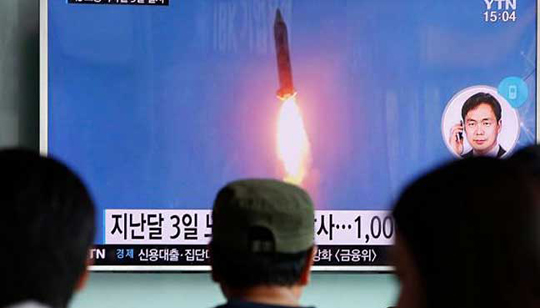Seoul, Feb 12: North Korea fired a ballistic missile today in an apparent provocation to test the response from new US President Donald Trump, the South Korean defence ministry said.

The missile, launched around 7:55 am (local time) from Banghyon air base in the western province of North Pyongan Province, flew east towards the Sea of Japan (East Sea), it said.
The missile flew about 500 kilometres before falling into the sea, a defence ministry spokesman said, adding the exact type of missile had yet to be identified. "It is believed that today's missile launch ... is aimed at drawing global attention to the North by boasting its nuclear and missile capabilities," the ministry said in a statement.
"It is also believed that it was an armed provocation to test the response from the new US administration under President Trump," it added. Yonhap news agency said the South Korean military suspected the North might have been testing a intermediate-range Musudan missile.
Last October North Korea test-fired Musudan missiles twice from the same airbase.On a visit to Seoul earlier this month, new US Defense Secretary James Mattis warned Pyongyang that any nuclear attack would be met with an "effective and overwhelming" response.
"Any attack on the United States or our allies will be defeated and any use of nuclear weapons would be met with a response that would be effective and overwhelming," Mattis said.
Pyongyang in 2016 conducted two nuclear tests and numerous missile launches in its quest to develop a nuclear weapons system capable of hitting the US mainland.
In January leader Kim Jong-Un boasted that Pyongyang was in the "final stages" of developing an intercontinental ballistic missile (ICBM) in an apparent attempt to pressure the incoming US president. Trump shot back on Twitter, saying "It won't happen."
The latest North Korean launch also comes after Trump assured visiting Japanese Prime Minister Shinzo Abe that Washington was committed to the security of its key Asian ally.
"We will work together to promote our shared interests, of which we have many, in the region, including freedom from navigation and defending against the North Korean missile and nuclear threat, both of which I consider a very, very high priority," Trump said Friday.
Washington has repeatedly vowed that it would never accept North Korea as a nuclear-armed nation. Analysts are divided over how close Pyongyang is to realising its full nuclear ambitions, especially as it has never successfully test-fired an ICBM. But all agree it has made enormous strides in that direction since Kim took over after the death of his father and longtime ruler, Kim Jong-Il, in December 2011.




Comments
Add new comment